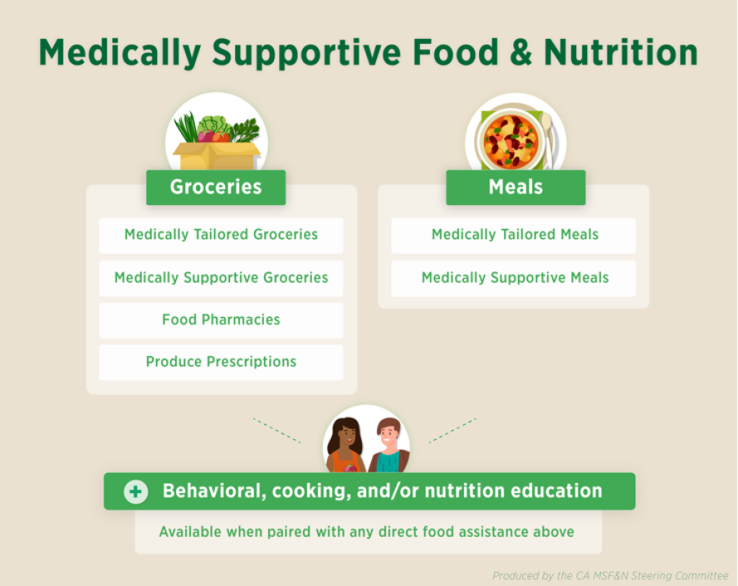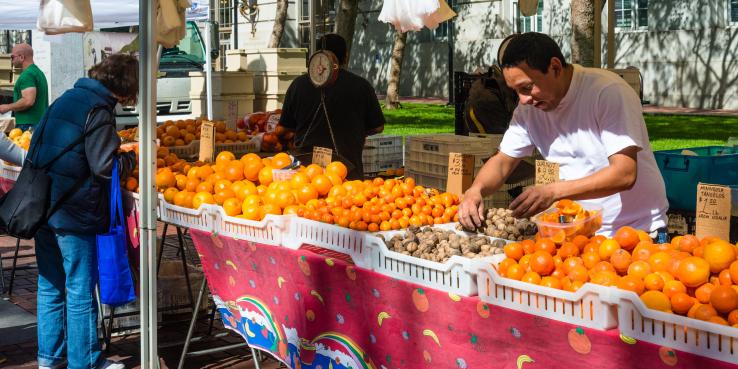UPDATE:
Despite unanimous bipartisan support in the Assembly Health Committee, AB 1644 was killed when it was held “in suspense” in the Assembly Appropriations Committee in May 2023. Due to a lack of transparency in the California legislature, we can’t be certain why the bill was held, but we primarily attribute it to concerns over the state’s nearly $32 billion budget deficit. The coalition advocating for AB 1644 is undeterred, however, and Assemblymember Bonta plans to continue to champion provision of medically supportive food and nutrition for Medi-Cal patients.
Making healthy food more affordable for low-income Californians is a top priority of SPUR’s Food and Agriculture Program. This year, we are co-sponsoring two bills in the state legislature with that goal. Both bills aim to strengthen the state’s food safety net by turning pilot projects with a strong track record of impact into permanent programs.
CalFresh Fruit and Vegetable Supplemental Benefits Expansion (AB 605)
With the end of emergency allotments in March, the average recipient of CalFresh — the state’s federally funded food assistance program — saw a drop of $90 per month in their benefits. For some individuals and families, the drop was hundreds of dollars per month. This “benefits cliff” coincides with historically high food inflation, making it even more difficult for Californians to afford food.
At nearly the same time that benefits were cut, the California Department of Social Services went live with the CalFresh Fruit and Vegetable EBT Pilot Program, which provides households participating in CalFresh with up to $60 each month in additional food assistance when they buy fresh fruits and vegetables with their electronic benefits transfer (EBT) cards. The fruit and vegetable supplemental benefits program, in which SPUR has been deeply engaged, could help blunt some of the pain of the benefits cliff. It also will help California farmers, who grow the vast majority of produce sold in grocery stores (and all the produce sold at certified California farmers’ markets).
Assembly Bill 605, the bipartisan CalFresh Fruit and Vegetable Supplemental Benefits Expansion, would greatly expand the CalFresh Fruit and Vegetable EBT Pilot Program, allowing it to reach more people quickly. Introduced by Assemblymember Joaquin Arambula, co-authored by Assemblymember Devon Mathis and Senator Scott Wiener, and co-sponsored by SPUR and Nourish California, the bill and its companion budget proposal would dedicate $93.75 million over two years to dramatically increase the number and geographic diversity of retailers offering fruit and vegetable supplemental benefits to CalFresh participants.
Like last year’s proposal, the bill would jumpstart this expansion in four ways:
- Provide supplemental benefits to CalFresh customers through three categories of retail outlets, including larger grocery retailers that would distribute $20 million per year, smaller grocery retailers that would distribute $10 million per year, and farmers’ market and other direct farm-to-consumer outlets, like farm stands, that would distribute $15 million per year.
- Commission the development of mobile-friendly software and devices that would allow farmers and smaller retailers like corner stores to offer supplemental benefits more easily.
- Direct the state’s CalFresh Healthy Living Program (known as SNAP-Ed in other states) to create outreach material and to bolster marketing of the new benefits.
- Direct the California Department of Food and Agriculture to support technical assistance for retailers by providing grants to on-the-ground partners who will recruit, train, and support grocery stores and famers’ markets that want to offer supplemental benefits.
A few aspects of the bill have changed from what was proposed last year in AB 2153. Most notably, the scope of the expansion and the size of the funding request are lower this year — reflecting the constraints that the state budget is facing. Also notably, the program design would allow CalFresh participants to earn supplemental benefits when purchasing any fresh fruits and vegetables, not just California-grown produce. SPUR has long advocated for the California-grown requirement, but enforcing it in grocery stores raised numerous concerns for the California Department of Food and Agriculture. Dropping that requirement will make it easier for grocery stores to participate in the CalFresh Fruit and Vegetable EBT Pilot Program and simpler for CalFresh participants to navigate it.
AB 605 doesn’t just help hundreds of thousands of households in the short term. In the long term, it positions supplemental benefits to become permanently available to CalFresh families throughout California — a “win-win-win” that reduces hunger, improves public health, and boosts California’s agricultural economy. Those potential wins make SPUR hopeful that the legislature and governor will pass AB 605 and its associated budget proposal.
Read more about CalFresh Fruit and Vegetable Supplemental Benefits Expansion
The Case for Fruit and Vegetable Expanding Supplemental Benefits
Nourish California / SPUR Fact Sheet
Testimony from CA Assembly Human Services Hearing
Making Medically Supportive Food and Nutrition a Permanent Medi-Cal Benefit (AB 1644)
One in three Californians rely on Medi-Cal for health coverage. According to the 2021 California Health Interview Survey, among people with Medi-Cal, 15% of individuals live with diabetes and 34% suffer from high blood pressure. Black Californians are nearly twice as likely to be diagnosed with diabetes than white Californians and more than 10% more likely to be diagnosed with high blood pressure. Medically supportive food and nutrition (MSF&N) interventions can prevent and treat these often-debilitating chronic conditions.
These food-based interventions, commonly known as “food as medicine,” are integrated into healthcare. The spectrum of medically supportive food and nutrition interventions includes medically tailored meals, medically supportive meals, food pharmacies, medically tailored groceries, medically supportive groceries, produce prescriptions, and, when paired with food provision, nutrition supports.
Medically Supportive Food and Nutrition Interventions

California has already recognized the critical role of nutrition and its influence on health outcomes and health equity through its inclusion of MSF&N interventions in California Advancing and Innovating Medi-Cal, better known as CalAIM. CalAIM is California’s five-year waiver that allows the state to test innovative ways to provide patient care, including food-based supports. However, under CalAIM, MSF&N services are optional, meaning individual health plans must voluntarily opt into providing them, leaving many people with Medi-Cal who would benefit from these critical interventions without access.
AB 1644 builds on the historic progress made through CalAIM. It was introduced by Assemblymember Mia Bonta, with principal co-author Assemblymember Buffy Wicks; co-authors assemblymembers Damon Connolly, Robert Rivas, and Blanca Rubio; and co-sponsors SPUR and the Food as Medicine Collaborative. By requiring Medi-Cal health plans to offer at least three MSF&N interventions as part of their benefits package, the bill gives medical providers multiple options to match the acuity of a patient’s condition to the intensity of the intervention.
AB 1644 would allow health plans to provide and be reimbursed for nutrition supports, including nutrition coaching, group medical visits, and cooking education and tools, as well as behavioral supports when paired with the provision of food.
The bill would support implementation of the new benefit by requiring the Department of Health Care Services to establish and staff a committee to provide expert guidance. The committee would, at minimum, include one representative from a provider of each of the seven MSF&N interventions and from Medi-Cal consumer advocacy organizations. It would operate for one year, beginning July 2025. Its work would require a small appropriation.
The new benefit would launch in July 2026 to ensure that no Medi-Cal patients would face a benefits cliff when CalAIM ends approximately six months later.
Transitioning MSF&N interventions from optional services under a time-limited waiver in healthcare to a covered Medi-Cal benefit will improve health outcomes and advance health equity across California. It will also reduce avoidable healthcare costs and support the prevention, not just the treatment, of chronic conditions.
Read more about Making Medically Supportive Food and Nutrition a Permanent Medi-Cal Benefit
SPUR / Food as Medicine Collaborative Fact Sheet
The Case for Medically Supportive Food and Nutrition
